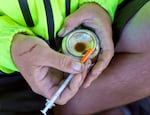Three years after Oregon voters elected to decriminalize drugs, a new study has concluded that the first-in-the-nation law has not led to increased drug use or drug overdoses. The conclusion counters an increasingly common narrative that Oregon’s drug problem is unique in the country — and that decriminalization is to blame.
“Our analysis suggests that state decriminalization policies do not lead to increases in overdose deaths,” Corey Davis, an assistant clinical professor at NYU Grossman School of Medicine and the study’s senior investigator, said in a statement.
Researchers at NYU, the Network for Public Health Law and the Centers for Disease Control and Prevention looked at 13 states with similar drug overdose rates to Oregon in the three years leading up to Measure 110 going into effect. They then compared overdose rates in Oregon to those same states in the first year after decriminalization.

A man, 23, sits on the sidewalk in downtown Portland, preparing what he says is heroin, June 25, 2021. Researchers at NYU, the Network for Public Health Law and the Centers for Disease Control and Prevention looked at 13 states with similar drug overdose rates to Oregon in the three years leading up to Measure 110 going into effect.
Kristyna Wentz-Graff / OPB
“Overdoses went up basically everywhere,” Davis told OPB. “What didn’t happen, is that they didn’t seem to go up more in Oregon after Measure 110 went into effect.”
The study used a similar methodology to look at overdose deaths in Washington where, in 2021, the state Supreme Court threw out a law making drug possession a felony. Washington lawmakers have since passed a new law making possession a gross misdemeanor.
The NYU study only looked at fatal overdoses because that is the most reliable data available. Nonfatal overdose data is difficult to collect for a number of reasons. Reporting standards vary widely across emergency services providers in the country and hospital data isn’t easily acquired. The data is typically sold to private companies, which then resell it to researchers. Buying the needed data for all 50 states could cost in the hundreds of thousands of dollars, Davis said.
It’s also possible decriminalization made people more comfortable calling 911 for help, leading to an increase in reported non-fatal overdoses. Davis said fatal overdose data is the most reliable.
“The state does a pretty good job of collecting and classifying those data and then they go to CDC, which does its own data cleaning and double-checking process,” he said. “Those data are about as strong as data get.”
Despite losing handily in the state’s rural counties, ballot Measure 110 passed with 58% of the vote. Now polls suggest voters might be rethinking their decision to decriminalize drugs. An April poll by DHM Research found that 63% of voters support bringing back criminal penalties for drug possession.
That suggestion of waning support comes as a wave of national media coverage has scrutinized Oregon’s approach and drawn a connection between a surging addiction crisis and Measure 110.
A group of business and political leaders are pressing to change the law and filed two voter initiatives this month that would make it illegal to use drugs in some public spaces and reintroduce criminal penalties for possession of small amounts of methamphetamine, fentanyl and heroin.
Hailey Hanauska with the Fix Ballot Measure 110 campaign pointed to a different study in the Journal of Health Economics that shows a 23% increase in overdose deaths from February 2021 to December 2021 — and attributes that jump to decriminalization.
“The point, regardless of either study, is that overdose rates in Oregon are skyrocketing, and we need to use all tools available to help move people into treatment and recovery,” Hanauska wrote in an emailed statement.
Initiative backers say Measure 110 has led to increased crime and exacerbated the existing homeless and mental health crises.
But a second study out of NYU, also led by Davis, contradicts that narrative as well. That study found that Ballot Measure 110 reduced the number of arrests for drug possession but did not lead to an increase in violent crime arrests. The study also looked at arrest rates for curfew violations, loitering, vagrancy, trespassing and disorderly conduct. Davis said arrests for those categories increased in Oregon after Measure 110 took effect but said there isn’t evidence to suggest the frequency of those offenses actually increased.
“I personally think it’s probably more … that the cops are like, ‘Well, I can’t arrest you for the drugs, but I told you to move along and you didn’t. So I’m giving you a ticket for that,’” Davis said.
Fewer arrests could eventually reduce overdoses. Research has shown incarceration increases the risk of future overdose. And just being arrested on a drug charge increases someone’s overdose risk, even if that person isn’t incarcerated.
Despite a reduction in arrest rates, the study released on Wednesday didn’t find a corresponding reduction in overdoses. That might be because the data was limited to the first year of implementation and the positive impacts of fewer arrests might be slower to materialize, the study’s authors wrote.
“My opinion is that, if you have a policy change that results in fewer arrests of people just for possessing or using drugs … that’s a good policy change because there are all kinds of harms we know associated with arresting people,” Davis said.


